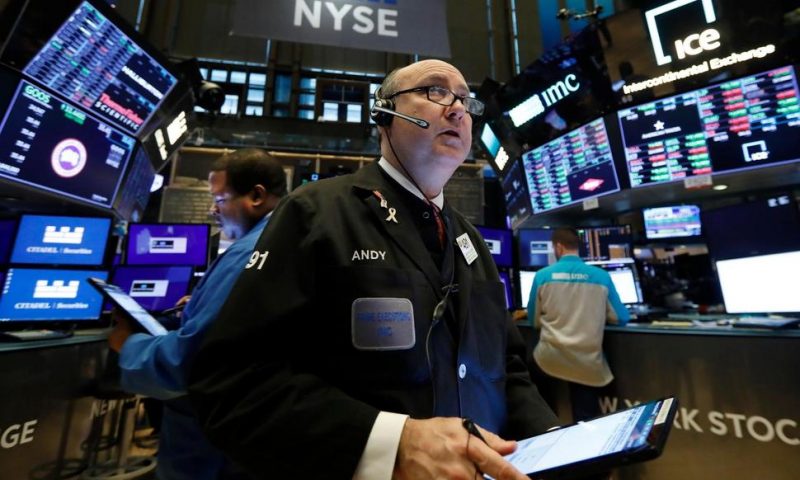Stocks are opening slightly higher on Wall Street, led by gains in health care and technology companies.
NEW YORK — STOCKS are opening slightly higher on Wall Street, led by gains in health care and technology companies. UnitedHealth, the country’s largest health insurer, climbed 2.2% in early trading Wednesday after reporting solid quarterly results. Microsoft was also higher. Banks were broadly lower after Bank of America and Goldman Sachs reported weaker profits. The benchmark S&P 500 index rose 5 points, or 0.2%, to 3,289. The Dow Jones Industrial Average added 57 points, or 0.2%, to 28,996. The Nasdaq rose 24 points, or 0.3%, to 9,275. Bond prices rose. The yield on the 10-year Treasury note fell to 1.79%.
World shares were mostly lower on Wednesday as conflicting reports raised concerns over the likely outcome of a trade deal to be signed by the U.S. and China.
Britain’s FTSE 100 edged 0.1% higher to 7,632, while the CAC 40 in Paris was down 0.2% at 6,028. In Germany, the DAX lost 0.2% to 13,431 after new figures showed the country’s economy grew just 0.6% last year, its weakest in years.
Wall Street looked set for a quiet start, with the future contracts for the Dow and the S&P 500 both down 0.1%.
Markets had regained upward momentum with expectations that Chinese and U.S. officials will sign a preliminary trade agreement in Washington on Wednesday that will stave off a further escalation of tensions between the two biggest economies.
However, concern over whether the deal will stick overshadowed that optimism after U.S. Treasury Secretary Steven Mnuchin said the deal will not reduce any punitive tariffs imposed on imports from China until after the two sides reach a further agreement.
“The only way the president will be reducing the tariffs is if there is a ‘Phase 2′ part of the agreement that is also fully enforceable,” Mnuchin said in an interview on Fox News.
Meanwhile, a report said that the Trump administration was preparing to propose a rule that would tighten restrictions of U.S. sales of technology to China’s Huawei Technologies.
It is unclear if the deal to be signed on Wednesday takes such issues into account.
“The US – China trade deal is like watching a live show in the theater of the absurd,” analyst Ipek Ozkardeskaya of Swissquote Bank said in a commentary, noting that the tariff cuts will not take effect immediately. “The risk here is that the double-standard agreement could provide a weak basis for the future negotiations, impair the benefits, or even spoil the deal.”
Japan’s Nikkei 225 index lost 0.5% to 23,916.58 while the Hang Seng in Hong Kong dropped 0.4% to 28,773.59. The Shanghai Composite index gave up 0.5% to 3,090.04. In South Korea, the Kospi slipped 0.4% to 2,230.98. Shares also fell in Taiwan and in Southeast Asia. But the S&P ASX 200 climbed 0.5%, breaching an intraday record high to 6,994.80.
The modest trade pact that President Donald Trump and China’s chief negotiator, Liu He, are scheduled to sign does ease some sanctions on China. Ahead of the signing, the U.S.. Treasury Department dropped the U.S. designation of Beijing as a currency manipulator.
Mnuchin said that was because the trade deal includes a “fully enforceable” chapter on currency policies.
Beijing, meanwhile, will step up its purchases of U.S. farm products and other goods.
Meanwhile, investors’ attention is also shifting to corporate earnings.
Wall Street expects corporate profits for S&P 500 companies in the last three months of 2019 to be down by 2%. That would be the first time that earnings for the S&P 500 would have declined four quarters in a row since the period ending in mid-2016, according to FactSet.
In other trading, benchmark crude oil rose 5 cents to $58.28 a barrel in electronic trading on the New York Mercantile Exchange. It gained 15 cents on Tuesday, to $58.23 per barrel.
Brent crude oil, the international standard, gained 1 cent to $64.50 per barrel. It gained 29 cents on Tuesday to $64.49 a barrel.
Gold rebounded, gaining $8.00 to $1,552.60 per ounce.
The dollar slipped to 109.88 Japanese yen from 109.97 yen on Tuesday. The euro rose to $1.1145 from $1.1128.

